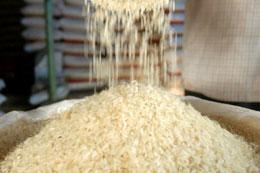Indian rice export ban triggers panic buying

By Shilpashree Jagannathan
New Canadian Media
Calgary-based Shravani Kumar, 33, was having a typical Friday until she read the news of the Indian government banning non-Basmati rice exports.
The software engineer, originally from the South Indian state of Karnataka, said the news turned her day into a hectic one. The export ban comes 10 months after India added 20 percent duties on rice exports, making it even more expensive. Kumar had to quickly strategize and find ways to stock up on rice amidst the new restrictions.
Rice is a fundamental staple in South Asian diets — a demographic that makes up 7.1 percent of Canada or over 2.5 million people, according to the 2021 census. Within South Indian communities, rice forms the basis of popular breakfast dishes like Idli, a steamed rice cake, and Dosa, a savoury rice crepe.
“I visited the grocery store last week, and had I been aware of the ban on rice exports at that time, I would have definitely grabbed extra bags of rice,” Kumar remarked. Her preferred choices are Sona Masoori and Idli rice varieties, which both fall under the non-basmati category.
Whatsapp groups are abuzz with questions about where to find substitutes that come close to the taste and texture of the type of rice they are accustomed to. Kumar, for instance, wanted to know if Calrose rice can be used as a substitute for her staples.
Iqbal Halal Foods, a prominent Indian grocery store in Toronto, witnessed a surge in Indian customers flocking to their store on Friday to purchase non-Basmati rice.
In response to the high demand, the store has implemented a restriction, allowing each family to buy just one bag of rice. Panchvati Supermarket, another Indian retail grocery chain in Ontario, has similar restrictions. Online and offline, stores are starting to implement these rationing steps.
According to Sriram Ramamurthy, the business development manager overseeing rice imports at Iqbal’s grocery, the rice ban has a major impact on their operations.
The store is known for importing around 40 different brands of rice and non-Basmati varieties make up approximately 40 percent of their rice imports. In response to the ban, the store has already been forced to raise the price of a 10-pound bag from $15 to $20.
“Our efforts to finalize a rice import deal which was underway has been completely halted by the ban,” Ramamurthy said. The most popular non-Basmati rice varieties at Iqbal Halal Foods include Sona Masoori, Surti Kollam, Ponni, Parmal and Seeraga Samba rice.
Canada relies on rice imports since the grain is not cultivated locally. India, being the world’s leading rice exporter, stands as the third-largest rice-importing country for Canada, according to the Observatory of Economic Complexity (OEC), an online data visualization and distribution platform
The latest ruling by the South Asian nation, which has already imposed restrictions on wheat and sugar exports, would affect about 25% of total rice shipments from India, according to a government statement. The grain is a staple for about half of the world’s population, with Asia consuming about 90% of the global supply.
“The move is painful for the trade,” said B.V. Krishna Rao, president of the Indian Rice Exporters Association.
India is grappling with high prices of grains, fruits and vegetables. Retail rice prices in Delhi have climbed about 15% this year while the average nationwide price has gained more than 8%, according to data from the food ministry. Prices of tomatoes in some areas of Delhi have surged more than five-fold since the start of 2023 as heavy rains in several areas have damaged crops and affected truck movements.
The South Asian nation, which accounts for about 40% of the global rice trade, had banned shipments of broken rice last year and imposed a 20% duty on exports of white and brown rice after Russia’s invasion of Ukraine sent prices of food staples like wheat and corn soaring. The nation supplies rice to more than 100 countries.
Those exporters, who had started loading the grain on ships before the notification, will still be allowed to export the grain. The traders, who have submitted their shipping bills and already berthed vessels at Indian ports, will also be permitted to send rice, the notification said.
The decision to prohibit some rice shipments will cut prices of the grain in the local market, according to a food ministry statement. Exports of non-basmati parboiled rice and basmati rice are still allowed and that will ensure local farmers continue to benefit from remunerative global prices, it said.









